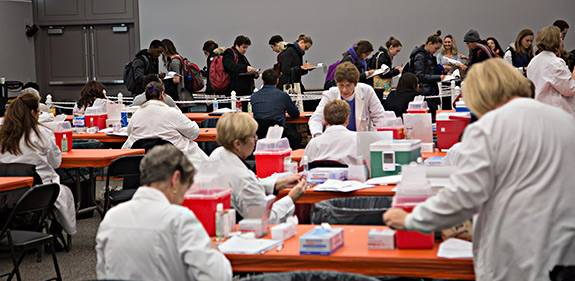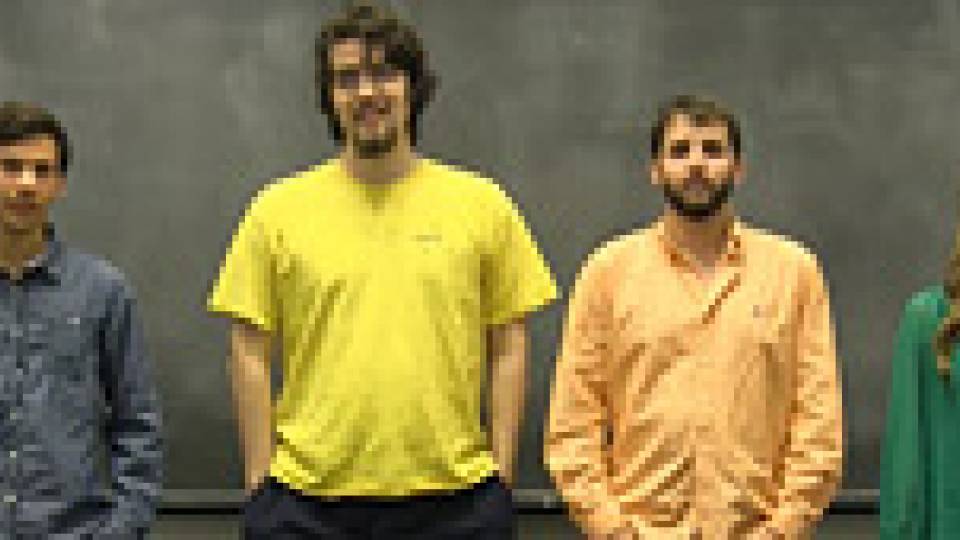Princeton University has provided the first dose of the meningitis B vaccine to 5,268 individuals, which represent 91 percent of the approximately 5,800 University community members who were eligible to receive the vaccine. Vaccinations were given during clinics in Frist Campus Center from Monday through Thursday, Dec. 9-12.
"We are delighted that so many of our students followed the Centers for Disease Control and Prevention's recommendation to receive the first dose of the vaccine," Vice President for Campus Life Cynthia Cherrey said. "That being said, it is important that students get the second dose in February to maximize their protection. We are grateful for the work of the many University offices, outside agencies and other partners who continue to diligently support our efforts to limit the spread of meningitis on campus."
Two doses of the vaccine, given at separates times, are needed for maximum protection against meningitis. A second dose will be available for eligible University groups in February at a time to be announced.
The University also will make special arrangements to provide the vaccine in January for eligible individuals who were not on campus for the first dose this week, or who will be away from campus for the second dose in February because of study abroad or other programs.
"With the support of University, state and local officials, the vaccination campaign ran seamlessly and expectations were exceeded regarding the number vaccinated," said Dr. Manisha Patel of the CDC's Meningitis and Vaccine-Preventable Diseases Branch. "However, it’s critical that everyone who got this first dose return for their second dose to boost and maintain individual protection, and accomplish our goal of preventing additional cases."

A meningitis B vaccine clinic was held in Frist Campus Center from Monday through Thursday, Dec. 9-12, for eligible University groups. A clinic for the second dose of the vaccine is planned for February. (Photo by Amaris Hardy, Office of Communications)
During the last day of the clinic Thursday, University Health Services staff reminded students about the importance of getting a second dose and continuing to be mindful of hygienic practices to limit the spread of meningitis, such as not sharing cups, eating utensils or smoking materials.
"Meningitis is a life-threatening illness and we need as many people as we can to get vaccinated," Dr. Janet Neglia said. "If we can vaccinate enough people, we hope to stop this outbreak."
Since March, there have been eight cases of meningococcal disease associated with University students and a student visitor, all of which were caused by meningococcal bacteria known as serogroup B.
Last month, the CDC recommended that all Princeton undergraduate students; graduate students living in undergraduate dormitories, the Graduate College and annexes; and other members of the University community with certain medical conditions receive the vaccine to help protect against meningococcal disease caused by serogroup B bacteria.
These groups were recommended to receive the vaccine because young adults and people with certain medical conditions (such as problems with their spleen or complement pathway disorders) are at increased risk of getting meningitis, especially those who live in close quarters such as dormitories.
Physics doctoral student Ji Qi said most of his friends who live in the Graduate College have been vaccinated.
"I wanted to get it because I hear the disease is very serious and I want to protect myself," Qi said after receiving his shot on Thursday.
Freshman Allie Burton said she had no reluctance about getting vaccinated, even with one arm already in a cast for a fractured elbow.
"I thought it would be better to get the vaccine and have a sore arm [from the shot] than to get meningitis," Burton said.
The meningitis B vaccine offered at Princeton is licensed for use in Europe and Australia, and was recently approved for use in Canada. It is not licensed in the United States, but the CDC and the Food and Drug Administration (FDA) have allowed the use of the vaccine for this particular situation at Princeton.
The University is covering the cost of the vaccine, and nurses from Maxim Health Systems administer the vaccine during campus clinics.
Information about future vaccine clinics will be updated on the University's meningitis website.
